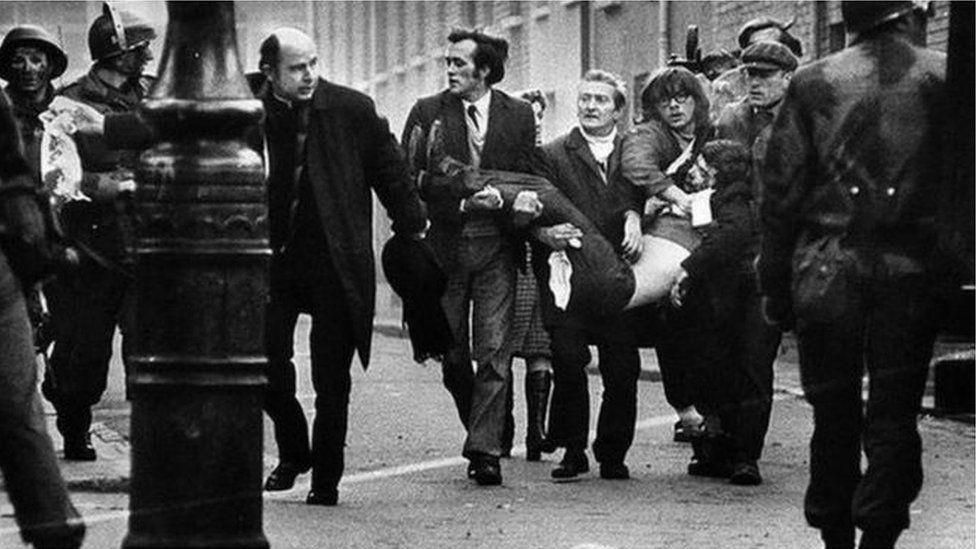
Thirteen people were killed and 15 wounded on Bloody Sunday on 30 January 1972
The Public Prosecution Service (PPS) will not prosecute seven people – including SDLP leader Colum Eastwood – in relation to an unnotified procession involving some Bloody Sunday families.
In August last year the Foyle MP accompanied relatives of some of the victims to a court hearing in Londonderry involving an ex-soldier accused of crimes including murder on Bloody Sunday.
In January police submitted a file to the PPS reporting seven people.
The PPS has now said prosecutions are not in the public interest.
SDLP MP Colum Eastwood described the police investigation as a “farce”
However, it said the seven individuals had participated in a public procession that had not been subject to the legal notification requirement.
In Northern Ireland you must give 28 days’ notice if you want to hold a parade or procession.
A PPS spokeswoman said the purpose of having legislative regulation of parades and processions in NI “is to control public disorder and damage, to minimise disruption to the life of the community and to enhance community relations”.
She added: “In this particular case, it was clear that the procession investigated did not raise any of those risks and therefore the public interest would not be served by pursuing criminal proceedings.”
Mr Eastwood described the PPS decision as “the right one”.
“The people of Derry have been standing with the Bloody Sunday families for over 50 years and nothing will ever change that,” he said.
“This entire process has added more hurt to families who have endured decades of pain. The complaint was completely vexatious and those responsible should be ashamed.”
In December the Foyle MP went to Strand Road police station in Derry but walked out after 20 minutes when, he said, no one came to speak to him.
The Bloody Sunday Trust also confirmed at that time that some relatives of the civil rights marchers who were killed or injured in Derry during Bloody Sunday – 30 January 1972 – had been asked to attend for police interview.
‘Decision raises questions about consistency’
DUP assembly member Gary Middleton said that the decision by the PPS “raises questions about consistency”.
“Everyone should be equal under the law and equally subject to the law,” he said in a statement.
“In this case the Public Prosecution Service seems to have abandoned that approach.
“The case raises questions about the consistency of approach from the Public Prosecution Service, particularly if they take forward prosecutions in the future.”
‘A victory for common sense’
Solicitor Ciaran Shiels, who represents a number of victims’ families and also Mr Eastwood, said the PPS decision was “a victory for common sense”.
“This was a matter that never should have troubled the PPS, who have genuine and serious criminal cases that require to be progressed through the courts,” he said.
“The decision taken by the PPS this morning was the only sensible and rational decision that could be taken in the circumstances.”
He said the initial complaint to police had been made by loyalist activist Jamie Bryson.
Mr Shiels said the PSNI “at the highest level have some extremely serious questions to answer”.
He added: “We now intend to immediately lodge a detailed complaint on behalf of the families and wounded to the Office of the Police Ombudsman for Northern Ireland.”
In a statement the PSNI said prior to submitting the file to the PPS its investigation had been conducted in line “with our statutory obligations”.
“We acknowledge their decision, and have nothing further to add at this time,” the PSNI said.
The former British soldier, known as Soldier F, is to stand trial for the murders of William McKinney and James Wray, plus five counts of attempted murder, in Derry on 30 January 1972.
Thirteen people were shot dead and at least 15 others injured when members of the Army’s Parachute Regiment opened fire on civil rights demonstrators in the Bogside area of Derry.
William McKinney’s brother Mickey welcomed the decision.
“It was the only decision they could have come to. What I am angry about is the timid appeasement and then the active facilitation of this complaint which has hung over us now for almost six months,” he said.
In a statement, the chair of the Bloody Sunday Trust Tony Doherty described it as “clearly the right decision”.
“Those family members who were threatened with prosecution have been made to go through over five months of worry for nothing,” Mr Doherty said.








